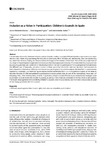Inclusion as a Value in Participation: Children’s Councils in Spain

Use this link to cite
http://hdl.handle.net/2183/30520Collections
- Investigación (FEDU) [938]
Metadata
Show full item recordTitle
Inclusion as a Value in Participation: Children’s Councils in SpainDate
2022Citation
Morentin‐Encina, J., Noguera Pigem, E., & Barba Núñez, M. (2022). Inclusion as a Value in Participation: Children’s Councils in Spain. Social Inclusion, 10(2), 54-65. doi: https://doi.org/10.17645/si.v10i1.4924
Abstract
[Abstract] The two‐way relationship between inclusion and participation makes municipal child participation organisations and expe‐
riences a key means of guaranteeing the inclusion in community life of children and adolescents, who are traditionally
excluded from decision‐making and the promotion of changes in the realities of their lives. One of the main objectives of
municipal child participation organisations is to ensure that these spaces are inclusive. This means that they must promote
equality of guarantees and conditions in the development of the right to participation from a perspective that addresses
the different axes of inequality, not only in access to these spaces but also in the relational dynamics that take place in
them. Based on a theoretical reflection on inclusion and participation, this article analyses the data from a questionnaire
applied to 279 people (191 technical figures and 88 elected authorities) from 179 municipalities in Spain, which seeks to
describe the state of child and adolescent participation in municipalities that are part of the International Association of
Educating Cities, Child Friendly Cities, or both. A qualitative analysis is made of those issues related to the strategies used
to promote inclusion within the Children’s Councils, as well as in the initiatives promoted in the field of child participation.
The results show agreement in considering Children’s Councils to be inclusive bodies, but the means and procedures used
do not always guarantee this inclusiveness
Keywords
Childhood
Equal opportunities
Human rights
Inclusion
Municipalities
Participation
Equal opportunities
Human rights
Inclusion
Municipalities
Participation
Description
This article is part of the issue “Promoting Social Inclusive Experiences in Uncertain Times” edited by Ana Belén Cano‐Hila
(University of Barcelona)
Editor version
Rights
Atribución 4.0 Internacional






